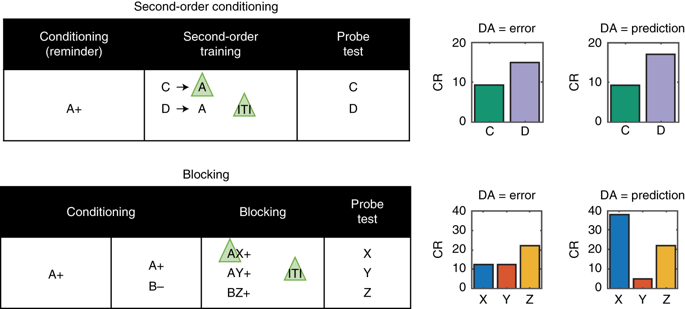当前位置:
X-MOL 学术
›
Nat. Neurosci.
›
论文详情
Our official English website, www.x-mol.net, welcomes your feedback! (Note: you will need to create a separate account there.)
Causal evidence supporting the proposal that dopamine transients function as temporal difference prediction errors.
Nature Neuroscience ( IF 25.0 ) Pub Date : 2020-01-20 , DOI: 10.1038/s41593-019-0574-1 Etienne J P Maes 1 , Melissa J Sharpe 2 , Alexandra A Usypchuk 1 , Megan Lozzi 1 , Chun Yun Chang 3 , Matthew P H Gardner 3 , Geoffrey Schoenbaum 3, 4, 5 , Mihaela D Iordanova 1
中文翻译:

原因证据支持多巴胺瞬变起时间差异预测误差作用的提议。
更新日期:2020-01-20
Nature Neuroscience ( IF 25.0 ) Pub Date : 2020-01-20 , DOI: 10.1038/s41593-019-0574-1 Etienne J P Maes 1 , Melissa J Sharpe 2 , Alexandra A Usypchuk 1 , Megan Lozzi 1 , Chun Yun Chang 3 , Matthew P H Gardner 3 , Geoffrey Schoenbaum 3, 4, 5 , Mihaela D Iordanova 1
Affiliation

|
Reward-evoked dopamine transients are well established as prediction errors. However, the central tenet of temporal difference accounts—that similar transients evoked by reward-predictive cues also function as errors—remains untested. In the present communication we addressed this by showing that optogenetically shunting dopamine activity at the start of a reward-predicting cue prevents second-order conditioning without affecting blocking. These results indicate that cue-evoked transients function as temporal-difference prediction errors rather than reward predictions.
中文翻译:

原因证据支持多巴胺瞬变起时间差异预测误差作用的提议。
奖励诱发的多巴胺瞬变被很好地确定为预测误差。但是,时差解释的中心原则(即由奖励预测线索引起的类似瞬变也起着错误的作用)仍然未经检验。在本通讯中,我们通过显示在奖励预测提示的开始进行光遗传学上分流多巴胺活性来防止二级调节而不影响阻断,从而解决了这一问题。这些结果表明,提示诱发的瞬变起时间差异预测误差的作用,而不是奖励预测。



























 京公网安备 11010802027423号
京公网安备 11010802027423号